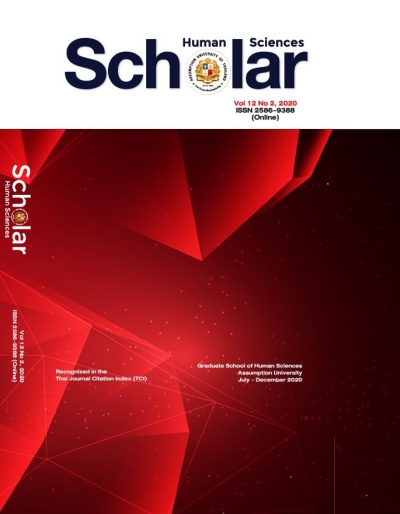The Development of Good Citizen’s Characteristics Program for Secondary School Students in Thailand
Keywords:
Good Citizen’s Characteristics, Development Program, Secondary School Students, ThailandAbstract
The objectives of this research were 1) to develop a good citizen’s characteristics program for secondary school students 2) to implement and evaluate of the program, and 3) to disseminate the program through the cyber network. The research sample for program implementation was 35 volunteer students from Mahavajiravudh Songkhla School under the school network of Somdet-Phra-Maha-Theeraratchao. While the data was analyzed by Mean, Frequency, Standard Deviation (SD), and t-test. The research results showed; 1) the development of good citizen’s characters’ program for secondary school students consisted of a) rationale and principle, b) objectives, c) the training contents comprise of three modules as Discipline, Honesty, and Social Service Mind, d) activities and instructional media, and e) evaluation. 2) The result of the program implementation on the desirable characteristics showed that an increasing of the average score in all indicators; Discipline (Mean =1.19), Honesty (Mean = 1.36); and Social Service Mind (Mean = 1.21) where the statistics of t-test for pretest and posttest showed the significance different at .05, and 3) the results of program dissemination via the cyber networks entitled “Smart Thai Teen” leaded the members to a) understanding of being good citizens and having self-developments, b) inspiriting and believing in good deeds, c) valuing of good people and being aware of social problems.
References
Bandura, A. (1971). Social-learning theory. New York: General Learning Press.
Bandura, A. (1986). Social foundations of thought and action. Englewood Cliffs, NJ: Prentice-Hall.
Bandura, A. (1997). Self-efficacy: the exercise of control. New York: Freeman.
Bloom, B.S. and Krathwohl, D. (1956). Taxonomy of education objectives: handbook 1. Cognitive domain. New York: Longman, Green.
Breger, L. (1974). From instinct to identity: the development of personality. New Jersey: Prentice-Hall.
Kirkpatrick, D.L. (1998). Evaluating of training programs: The four levels. 2nd edition. San Francisco: Berrett-Koehler Publishers, Inc.
Kohlberg, L. (1963). Moral development and identification. In Stevenson, H. (ed.), Child psychology: Yearbook of the National society for the study of education. Chicago: University of Chicago Press.
Leesavan, S. (2012). Vajiravudh College: Citizenship Education. Bangkok: Vajiravudh College.
Moral Center & Nida Poll. (2016). The survey of moral situation in Thai society project. Retrieved 30 March 2018 from http://nidapoll.nida.ac.th/file_upload/poll/document/20160829042941.pdf
Office of National Education Commission. (1999). National Education Act of B.E. 2542 (1999). Bangkok: Office of Prime Minister, Thailand.
OXFAM. (2006). Education for Global Citizenship: A guide for schools. Retrieved from http://nzcgs.org.nz/wp-content/uploads/2016/03/education_for_global_citizenship_a_guide_for_schools.pdf on November 14, 2016.
Rogoff, R.L. (1987). The training wheel: a simple model for instructional design. New York: J Wiley.
Trilling, B. & Fadel, C. (2009). 21st Century Skills: Learning for life in our times. San Francisco, CA: Jossey-Bass.
UNESCO. (2014). Global Citizenship Education: Preparing learners for the challenges of the 21st Century. Retrieved from http://unesdoc.unesco.org/images/0022/002277/227729E.pdf on October 20, 2016.
UNESCO. (2015). Global Citizenship Education: Topics and learning objectives. Retrieved from http://www.oosci-mena.org/uploads/1/wysiwyg/Global_Citizenship_Topics_Learning_objectives_UNESCO.pdf on October 20, 2016.
U.S. Department of Education. (2005). Helping your child become a responsible citizen: with activities for elementary, middle and high school-aged children. Retrieved from https://www.galenaparkisd.com/campuspages/clf/documents/HelpingYourChildbecomeResponsibleCitizen.pdf on March 30, 2018.
Yamchim, N. (2017). Announcing of five social problems in Thai Society that Thai people need of change immediately by Dusit Pool. Retrieved 30 March 2018 from https://www.matichon.co.th/education/news_545551




